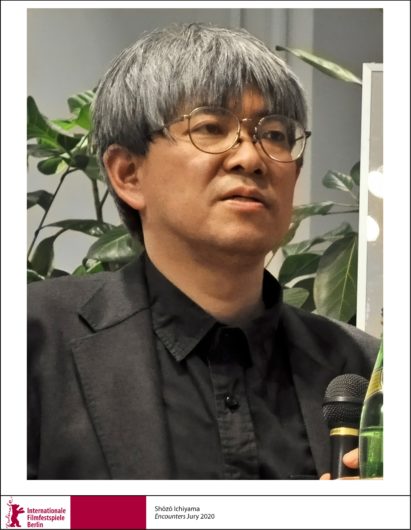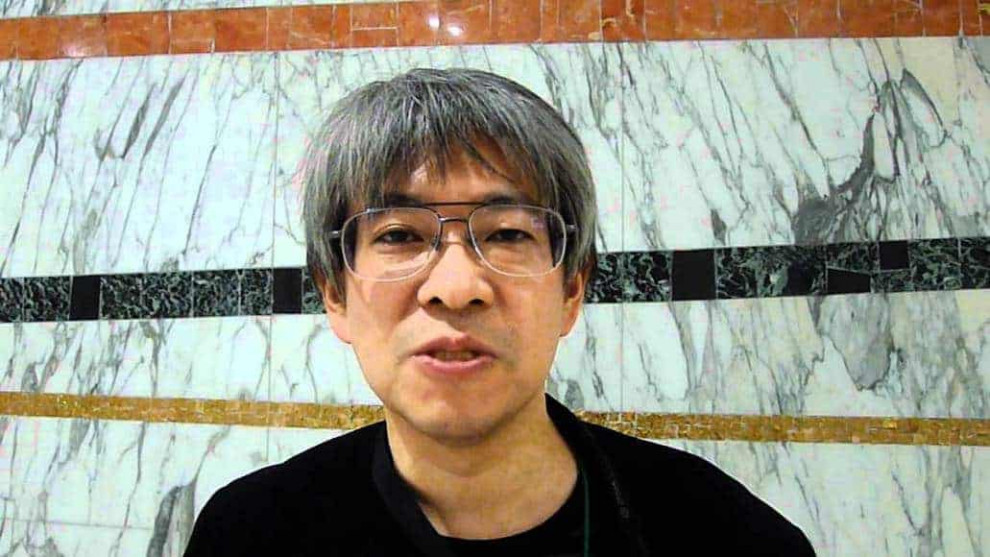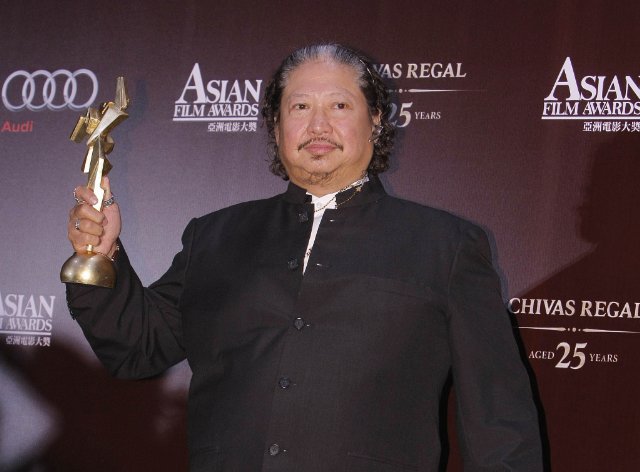For the past 20 years, Shōzō Ichiyama has been one of the key figures in independent Asian film industry. He is a producer of over 20 films, founder and director of TOKYO FILMeX Film Festival and Tokyo Talents program. He has produced films by Jia Zhangke, Hou Hsiao-hsien or SABU and boosted the career of many young independent filmmakers, including bringing the core biggest titles of Asian art-house closer to the audience. Ichiyama was invited to Encounters Jury at this year edition of Berlinale, during which we managed to have an interview with him.
The interview was conducted and translated from Japanese by Lukasz Mankowski on the occasion of Berlinale 2020.

Lukasz Mankowski: Tokyo FILMeX has been established almost 20 years ago. Was there any change of the mission and vision of the festival comparing to what it was at the beginning?
Shōzō Ichiyama: Well, yes, I'd say the festival has changed, but not in terms of its purpose. At first, I thought there wasn't a lot of attention to independent filmmakers for some unknown reason for me. At that time, I worked for Tokyo International Film Festival, the biggest film festival in Japan, and I decided to stop in order to create a space for independent film. One, where you could put Asian independent filmmakers together, bring the audience closer to an art-house cinema and show them what stands for the ‘new'. TOKYO FILMeX is that kind of a place. Of course, there are films from outside of Asia as well, as we have several sections, but the competition one is limited to Asian films only. An important concept for us was to bring the new voices and talent, who has just started their journey in the film world. That is still the main idea of the festival, there were no changes in our direction regarding that – emerging talent is our main focus. But, around 10 years ago, we've implemented something we think was a hugely positive change. Following the concept of Berlinale Talents, we've started our own talent development program, Talent Tokyo. Starting from 2011, Talent Tokyo became the sole Asian edition of Berlinale Talents, where we could support emerging filmmakers coming from East and South-East Asia, e.g. from Singapore or Malaysia, directors or producers. Every year, these are 15 upcoming and very talented filmmakers. I think I may say, that these workshops turned out to be successful each and every single year ever since we started to collaborate with Berlinale. After Tokyo Talents, they go to present their work at other international festivals, they strive for success too, so that was perhaps the biggest change that happened at FILMeX. Aside from that, we've never wanted to simply present the films to the audience, but also cultivate the idea of bringing the authors of the film. That is something TOKYO FILMeX was always appreciated for and that hasn't changed since its beginning.
On your website there is a sentence in the statement for the mission of the festival, that you ‘want to take care of the future of film culture'. Is Tokyo Talents part of that idea as well?
Indeed! At first there wasn't such a goal in specific. But with time and people starting to recognize what FILMeX stands for, we thought of that. With running a festival, there is always a thing with the audience – we didn't just focus on presenting the films to the viewers, but rather go for something that would help the future of the film. That was the general thought. Of course, it is different when you present the film of someone, who is already acclaimed and well-known. During the first edition, we presented the debut of Apichatpong Wereseethakul, who 10 years after that was awarded with the Palmes d'Or, but back then – he was new to the scene. With that being said, we don't want to focus entirely on new voices, but also present the work of acclaimed filmmakers, because they also deserve it. To speak more specifically about Tokyo Talents workshop, yes – it is a part of this catching phrase of thinking about the future of film. We want to think about the future of cinema and we want to make people think about it too, so the Tokyo Talents project is an implementation of this thinking into practice. We can watch whatever films wherever we want, even those coming from abroad; we can watch them at home on the internet or on a DVD bought from Amazon. But when you think of the essence of film festivals, it is about reaching out for the future and making the space that this future can happen. It is not just about showing films anymore – this is not the way the festivals should go – but rather about connecting the links for the sake of future. This is the most important aspect. That's why Berlinale came up with the project of Berlinale Talents and many other film festivals followed with its concept, including TOKYO FILMeX exactly 10 years ago.

Speaking of the role of film festivals and increasing access to films – how did the VOD platforms like Netflix influenced the festival landscape, including independent filmmakers?
Well, Netflix has influenced film industry in various fields. It may be criticized for many reasons and people probably won't hide it and treat is as a threat, especially those who operate cinemas, but there are also some good sides of a VOD distribution. For instance, when young filmmakers start working on their film, they can sell the right for the film for quite high price and without a doubt, it might be a chance for good money for them. This film will be tied with the company, but it may earn for itself. Of course, it depends on the situation, some of the cinemas might not want to be involved with the film. But one thing that it brings to the table is film equipment and studios – filmmakers can keep going and do their job with what Netflix can offer. We need to remember that Netflix started as a film streaming distribution company (and barely nothing more at the beginning). This is something worth mentioning.
What about theaters?
In opposition to it, as for the theater venues, they also cooperate with filmmakers. They offer the space, so the screenings may take place at the particular cinema. They cannot afford not doing this these days. It's not an era that the cinemas may stay passive and simply wait for the contact by distribution companies that had bought the rights for the film beforehand. They need to raise a voice in order to survive, that's a reality. That is why the cinemas need to keep their fingers on the pulse and contact Netflix to ask for the possibility of screening the film. This is necessary, that's how it goes. Once done, film goes to the cinema and is immediately distributed. Before the era of Netflix, it took a really long way to have the distribution done. In a ‘classic' way, it used to be a cinematic premiere first, then television broadcast, finished with a VHS release. Now, the pace has changed completely. In an ideal scenario, Netflix decides to buy the rights for the film, the distribution takes almost the same amount of money that production does, but then, the film becomes watchable for the audience in the entire world. There are more and more cases like that, when the films go from a festival premiere to a VOD platform.
Do you have any particular titles in mind?
Last year at Berlinale, there was a premiere of the Japanese film ”37 seconds” (directed by Hikari). Everybody said it would be a perfect fit for Netflix and eventually it became available at their VOD platform and world-wide accessible. This system works especially great for independent filmmakers. As a matter of fact, it might be actually very helpful for them. Of course, it does not have to work for all of them and not everybody thinks this way. But just because it leaves an open door for young filmmakers, I think this is great. Other internet distributing companies do not seem to maintain the same page about collaborating with film festivals, presenting rather a negative attitude towards that and not thinking about the bigger picture. Netflix is eager to discuss, collaborate and screen their films at the festivals and vice versa – present titles from the festivals at the streaming platform. I don't see anything wrong in that. As for film theaters, I think that since the system has changed, there are more things to pay attention at. As for the festivals, there are more and more festival films being streamed at Netflix. One of them is ”A Land Imagined” (by Yeo Siew Hua), also screened at FILMeX with good response from the audience, but in fact, no one in Japan bought the rights for a domestic distribution, so not many people could actually see it. Thanks to Netflix, everybody became able to watch it, not only people from Tokyo, but even in smaller cities. That is also the reason, why I think this system works good for both: the filmmakers – especially independent ones – and the audience.
What about the difference in screening these titles in Japanese independent cinemas and multiplexes?
Well, it's different for the cinemas that control what they want to show. There are plenty of multiplexes that won't screen Netflix films. But for the small ones, they really want to present these films, and the audience wants to watch them. The price of the ticket is important, too. For instance, ”Irishman” was quite successful. There were many sold-out screenings in local cinemas for many days. It depends on the country, but in Japan, there are people who want to watch Netflix films in the theaters, even though they are accessible online. All in all, it's not a bad thing and we can't really do nothing about it. Netflix happened and what we should do is what good it can bring.
People want to watch Netflix films in theaters, but what about original films at the platform? There are plenty of Japanese series, but not so many films.
Yes, indeed. One of the very recent successful ones was “The Naked Director”. Right now, there is really no Japanese film that could be acclaimed as a hit on Netflix. Series are definitely more popular and they fit Netflix perfectly. These productions mostly consist of independent filmmakers and there are so many titles produced. To pay them all – it takes a lot! The world of film industry, this is a brutal one; that's why I think it's a good opportunity for them. They can stay in the business and do their jobs. In the Japanese film industry, everybody wants to have their work done with possibly the least amount of money invested, so the fact that their salaries are paid – I think it's very good.
Has the change of the financing system played any particular part in independent filmmaking in Japan?
This is not the easiest question to answer. I think one of the factors was the appearance of a certain hope, that some filmmakers started to have. That's for sure. For instance, one surprisingly enormous indie hit was “One Cut of the Dead”. It multiplied its budget several times, earning millions.

There was a sophomore film made by Ueda recently – “The Special Actors”.
Yes, there was and it's a very interesting and even scary case. Ueda made his first film, it became successful and immediately everybody wanted another piece. “One Cut of the Dead” was made independently, started from a very small project, but “The Special Actors” was produced by a huge studio company – Shōchiku. It's a general problem of the financial aspect of the film industry, because if “ The Special Actors” would be a financial failure, it would be a matter of the film itself, its artistic values, not the distribution or production issues. Just because his first film was a success, it is expected that the next one will also be. There was a possibility that “One Cut of the Dead” would be a success, it's not like there was none, but there was no pressure. In the past, when the independent film earned hundreds of millions yen and was distributed world-wide, it was unthinkable. The sole fact that independent films can have this possibility of a success, I think it's wonderful. For sure, due to expansion of multiplexes, local cinemas will go down, there is no doubt that this is bad for the film culture. But if we take a look at the independent cinema having a success through a big chain of multiplexes – this is something rare. The other example would be Korean film “Parasite” by Bong Joon-ho, who has just won an Oscar and was a huge hit world-wide, too. This is also a film coming from an art-house and independent director. “Parasite” is a financial success and this is also mainly thanks to the distribution to multiplexes, we can't deny that. When I started working in cinemas in the 80s, it was a completely different era. A lot has changed since then, but this situation right now, it might be an exception, but surely it brings some hope and bravery to independent filmmakers. Not everyone will make a success, some may even only dream of it, but even still – through this dreaming they may accomplish some great things.
Speaking of awards – do you think that recent awards for Bong Joon-ho or Hirokazu Koreeda may bring any change in Asian film industry?
I'm also curious about it. We will be able to see it after several years, but I think it's good that we're in the moment when we can actually notice that the things are going well for Asian Cinema. Of course, it's not that everything in every field of the industry is all bright. But, just the fact that it is being appreciated more and more abroad, I think there is a big chance for a good change. The moment when Koreeda won Palme d'Or was quite important for art-house cinema in Japan. Everybody wanted to see “Shoplifters” and it was screened even in multiplexes, obviously becoming an instant hit. What was important, was that it spread through the country and it created a need for something else, something new. Japanese audience started to seek for something else than romance films, tear-jerkers or entertaining films…

What about Japanese horror film now?
Horror film… It's in a particular state now. Most of the people buy the DVD/blu-ray releases or watch it online, but there are not so many people watching it in cinema. Horror as a genre doesn't seem appealing to audience anymore. Recently released “Howling Village” by Takashi Shimizu (known for “The Grudge”) was barely hanging in the box office, but there are many films that fail financially pretty substantially. Comparing to the era of “Ring”, it's completely different. These films take a lot of budget, but simply don't pay off. Like I said, this is time for love stories mostly, so the fact that people started choosing something else than that, so maybe it also can bring change to the industry in the future. Maybe, step by step, more and more people will want to watch a film, that won't be a romance with idols in it, and the reason for it may be the success of “Parasite” as well.
I'm thinking of the success of “One Cut of the Dead” – what if it was sold to Netflix before going world-wide? It wouldn't become a cult-film with such a huge international success. This situation “sell or not to sell” surely brings some pressure to filmmakers and producers.
It's a very difficult position. From the point of view of producers, it is better to sell the rights beforehand. It gives confidence and safety that it will find its audience and it will be in cinemas anyway. I think the same, that it's better to sell it to the platform before going world-wide theater release. It doesn't have anything to do with Japan, but I've heard that Chinese-American co-production “Farewell” did have a similar problem. At first, they wanted to sell it to Netflix and have a proper theatrical distribution, but they were rejected from the side of the platform and got a distribution from A24. If you have enough confidence, that it will fit in the cinemas without the further help of VOD platform, then it is good. Good, but risky. But if not, if you don't see the goal, the peak of possibilities, then it is worth considering selling the rights to Netflix. It's not like Netflix is having a war with cinemas. If the film is good enough, cinemas themselves will want it in their program. At first, maybe there was a problem with communication between Netflix and different cinemas. But now, these are the cinemas that ask for the films. At the end of last year we had “Irishman”, “The Two Popes” and “Marriage Story” – all three from Netflix – and they had a proper theatrical distribution, even being streamed shortly after the world premiere. It has just created more possibilities.
In the past, you were the producer of independent films by Jia Zhangke or Hou Hsiao-hsien. Do you think if they started today, would they opt for working with Netflix?
I really wonder. If the productions were quick, I think yes. I am a producer, so I would probably say it's better to do so. However, I don't think there are really many people who would turn it down. When you're a filmmaker, it is valid to keep on making films and that offer is a safe option to keep doing it. When you don't make it to the public, then everybody loses – we don't want it. Of course, there are special cases, rare exceptions, but I think most of them would accept the offer. I think the most important think in filmmaking career is to keep making films, that's all. That's why they would probably accept the offer, if they had to start these days.

At the website of TOKYO FILMeX there is a motto: aim for the ideal festival. What is that aim exactly?
For sure one of these goals would be the talent workshops we've just talked about. That's a one good way. But more than everything, I would aim for mutual support, something that, for instance, Berlinale World Cinema Fund offers. As much as possible, I'd like to have a space, where people could contribute for the future of films. That's the goal I'd like to pursue.















